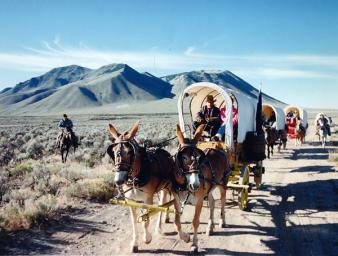The Difficult Journey
The wagon train left early this morning. I told my friends goodbye, since I would be staying here in Denver. We had been traveling for many months. It was June when we left St. Louis but it was October now. I would not stay with the wagon train any longer.
When we left St. Louis, we were very excited. We were going all the way to the ocean. We would go to California.
Then we had our first problem. The first day a wheel came off our wagon. It was cracked, and we could not fix it ourselves. We were not very far from St. Louis, so John rode back there on his horse. He came back with another wheel, but that took a day while the other families waited.
Then we ran into our second problem—a big rainstorm. It caused so much mud that the oxen pulling our wagons could not get the wagons to move. We had to wait for the rain to stop and the mud to dry. That meant we lost two more days.
We were tired and it had been just two weeks. Still, we kept on traveling. After the rainstorm cleared, we had to stop because the Brown family got ill. We waited a few days, but they gave up. They turned back around.
It was hard work every day, but we carried on. By the time we arrived in Denver, though, it was too much. We were going to leave the wagon train. That night we told the wagon master.
He asked us to change our minds. He told us, “The worst is over now,” but I knew it would not get any easier. The mountains we had just crossed were only the beginning. It had been such hard work to get where we are now. It would be even harder to reach the ocean. So we chose to remain here in Denver.
Today I have gone to look for a job. There are many jobs in the mines so I will take one of them. And we will get a home. I am glad that living in a tent next to the covered wagon is over. We will have a place where we can live.
Even though I will miss my friends, I will not miss all the troubles.
